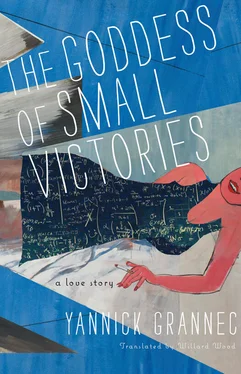“Our house.”
Einstein had missed knowing his great-grandson by a few months. He’d never been on very good terms with his son Hans Albert anyway. His personal relations, including those with his wife and his children, had all been failures. 59He was too fond of sex and science to burden himself with a family. Kurt hated to hear me talk like that about his old comrade. For him, Albert would always be the personification of friendship. He often reproached himself for not having paid more attention to Albert’s health. Kurt put his friend’s memory under a dome and found no consolation in remembering the imperfections of his life. Albert would have tweaked him for his nostalgic idolatry. For my part, I’d always distrusted selective memory. It prolongs mourning.
“Where did you put the bust of Euclid that he gave me? It used to be in the living room.”
“In the cellar, with the one of Newton. Their blank stares gave me the willies. I put them side by side, they’ll have plenty to occupy them.”
“They’re waiting for us. They’ll make us pay for it when we get up there.”
“Don’t be so macabre! Black humor isn’t suited to your complexion, Kurtele.”
He leaped from his deck chair.
“This time I’m sure I heard the telephone!”
Herr Einstein would remain a man of flesh and bone for me. I would remember his thunderclap laugh, his half-open bathrobe, and his tousled hair. I could never be angry with him. He would subject me to his salacious jokes and his unflattering comments, then take my hand and win back my affection with a smile. I loved him like the father-in-law I never had. I liked his paradoxes: he claimed to be a vegetarian but always asked for my schnitzels; he could live neither with nor without women. Always taking pleasure in things, he was Kurt’s double negative. What separated them had brought them together. I would forget relativity; I would forget the bomb; I would forget his genius. The only sentence of his I kept preciously guarded in my memory was from an official ceremony in his honor. His stepdaughter, Margot, reproached him for not changing his clothes for the occasion. He had inspected his moth-eaten sweater with satisfaction: “If they’re interested in me, then here I am; if they’re interested in what I wear, then you can just throw open my closet and show them my clothes.” I was jealous of his freedom.
“They’ll be here in an hour! Put the roast in the oven!”
I gathered my sewing, ignoring my husband’s impatient noises. I grabbed my mother under the arms and led her indoors. I had to keep an eye on her while I prepared the meal.
Even if the Gödels were planning to put me under inspection, I was easy in my mind, almost happy to welcome them. The visit would distract Kurt from his sadness; he was filled with something like energy at the prospect of seeing his family again.
My house and garden were irreproachable. My husband, despite his oddities, still inarguably enjoyed prestige in his profession. After twenty years of marriage, despite everyone and everything, we were still Adele and Kurt. I could show Marianne Gödel that she had been wrong; I had been more than a nurse to her son.
“Take that horrid balaclava off, Kurt! Your mother is not going to recognize you.”
Anna looked into her cat’s eyes without smiling. “You’re so strong!” The sphinx made no response. “What lovely fur you have!” He approached and favored her with a bump of his backside. Adele’s theorem didn’t work. Or else it was a female cat. Anna shooed the animal away with her foot. Someday she might decide to name it. She went into her tiny kitchen and hunted around for something to eat. The cabinets were empty, except for a dusty old box of All-Bran. She settled for the slabs of turkey from the night before, wolfing them straight from the plastic container. She suddenly noticed just how dirty the room was. She pulled on a pair of rubber gloves and started sponging the shelves, humming a little tune. “ Do, re, mi, fa, sol, la, ti, do.” The Sound of Music had been playing continuously in her head since her outing with Adele. What nutty criteria was her brain using that it retained only the sappiest tunes? Roger Wolcott Sperry should have looked into it. She scrubbed the sink, then addressed the stove top, crusted with burnt milk from the days when she was still interested in breakfast. Her neurons had reached saturation with Julie Andrews’s trills. She rooted through her record collection. Ziggy Stardust . Fräulein Maria could go back to her Alps. Today would be a new day.
She liberated the vacuum cleaner from a cluttered closet and piloted the appliance around her three rooms like a dervish. The noise made the cat hide under the bed. Dripping with perspiration, she mopped the kitchen floor. She was going to empty her wardrobe when the downstairs doorbell rang, stopping her short. She thought twice about answering at all: she was covered in a mix of sweat and dust. She smoothed her hair and pulled on a bathrobe over her ratty pajamas. Leo would hardly dare show up unannounced again. But he did have a flair for impossible situations. The voice on the intercom dispelled her fears: it was her father paying a royal visit.
George Roth inspected the small living room without comment before setting down his heavy briefcase. He took a seat but didn’t remove his overcoat: the audience would be brief.
“I was passing through New York. I just came out to Princeton to give you a hug. Do you mind if I smoke?”
It wasn’t really a question; he couldn’t do without. He examined her with the surprised look she knew so well, as if he were suddenly rediscovering just how much she had grown.
“You don’t look well, Anna.”
She opened the window. He hadn’t come all this way to discuss her health. He lit a cigarette, leafing through the file folders stacked at attention on the coffee table. Anna had brought enough material back from the Institute to occupy her hours of insomnia and catch up on her work.
“I haven’t always been a very attentive father. But I was there for the difficult moments. You have to admit that.”
Anna stiffened. She recognized his way of preparing her to hear a difficult message: Don’t talk about my faults without thinking about your own .
“Carolyne is pregnant.”
She had been expecting the news for months; she worked at remaining impassive.
“I haven’t told your mother.”
“Did you come to ask for my blessing or my discretion?”
He looked for a place to drop his ashes. She brusquely handed him a saucer.
“I hoped you would share my joy. I don’t owe you an account of my actions, Anna.”
“So, why are you here. Have you discovered guilt?”
“Don’t bother playing shrink with me. I have a marriage’s worth of experience at that game already. You’re getting to be as much a pain as Rachel.”
He rose and picked up his briefcase — the art of running away was a hereditary talent among the Roths. Yet he couldn’t admit that they resembled each other, or that she had his personality. She would always be her mother’s daughter.
“I was maybe too young when I had you, Anna.”
“Just try to do better with your new toy.”
He put the stack of files back in its original impeccable order and gave his daughter a hard stare. She pulled her wrapper tight around her, already regretting her words. She had proved him right; her mother’s voice had come out of her mouth.
“You think you deserve better? Don’t go blaming anyone but yourself. Your frustration is the upshot of your pride.”
He left, patting her on the cheek as he went past and leaving an envelope with cash on the sideboard: “For Christmas.” Once the door had closed, she counted the bills; enough to buy herself twenty dresses like the tarty, useless one she had bought at Thanksgiving.
Читать дальше












